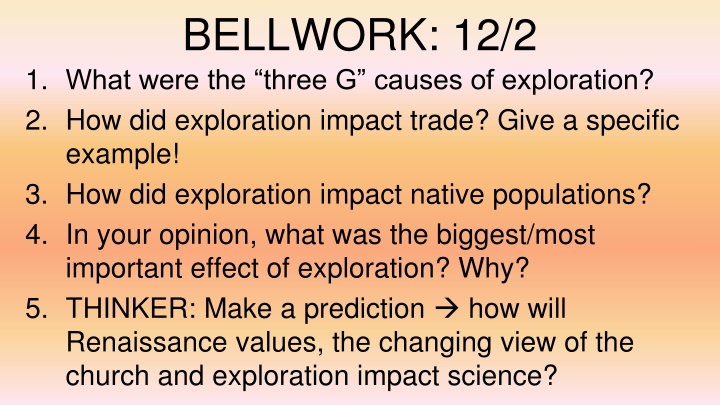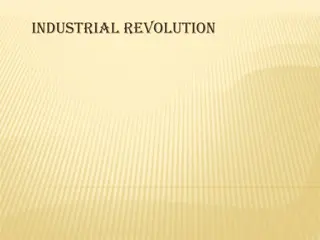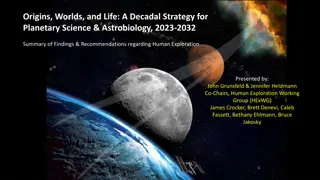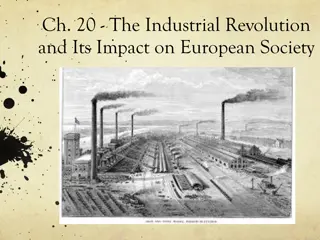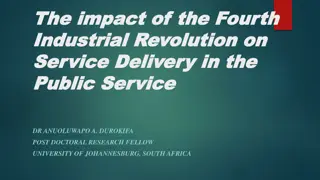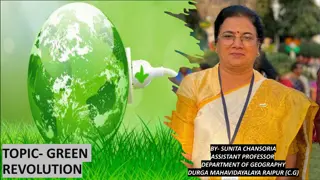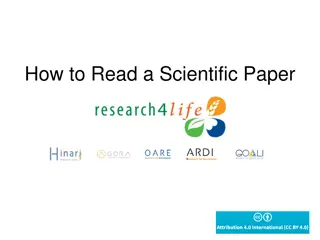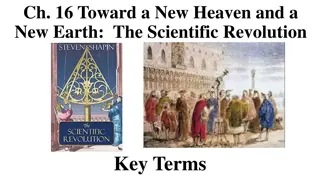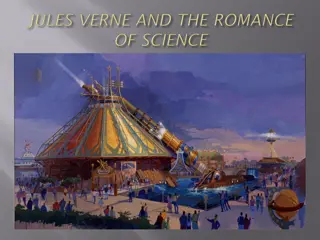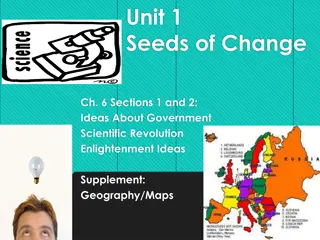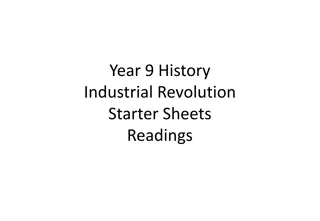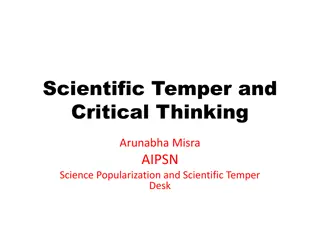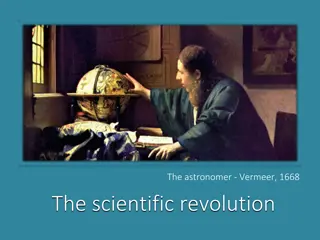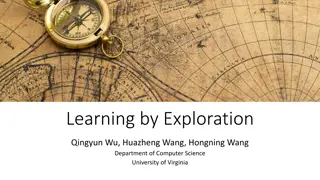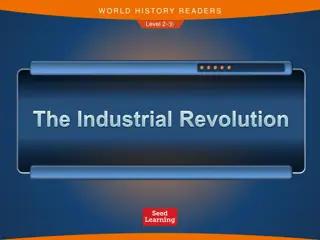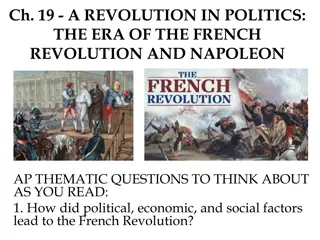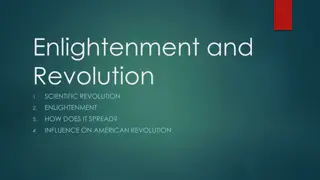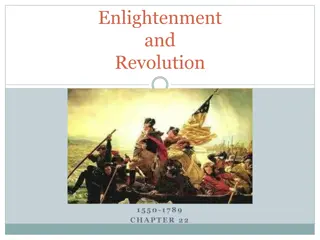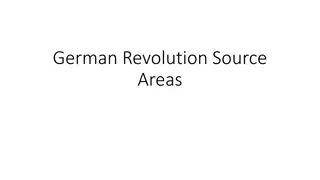Impact of Exploration and Scientific Revolution on Society
Exploration in the age of discovery was driven by economic, political, and religious motives, impacting trade and native populations while leading to significant scientific advancements and changes in societal beliefs. The Scientific Revolution challenged traditional views with new scientific methods and discoveries, shaping modern science as we know it today.
Download Presentation

Please find below an Image/Link to download the presentation.
The content on the website is provided AS IS for your information and personal use only. It may not be sold, licensed, or shared on other websites without obtaining consent from the author.If you encounter any issues during the download, it is possible that the publisher has removed the file from their server.
You are allowed to download the files provided on this website for personal or commercial use, subject to the condition that they are used lawfully. All files are the property of their respective owners.
The content on the website is provided AS IS for your information and personal use only. It may not be sold, licensed, or shared on other websites without obtaining consent from the author.
E N D
Presentation Transcript
BELLWORK: 12/2 1. What were the three G causes of exploration? 2. How did exploration impact trade? Give a specific example! 3. How did exploration impact native populations? 4. In your opinion, what was the biggest/most important effect of exploration? Why? 5. THINKER: Make a prediction how will Renaissance values, the changing view of the church and exploration impact science?
The Scientific Revolution No great discovery was ever made without a bold guess --Isaac Newton
The Middle Ages People believed: The earth was flat The earth was the center of the universe (God created the universe to serve people, therefore it was the center) This idea was called the Geocentric Theory Also used centuries-old myths & legends to explain events
Scientific Revolution The exploration era motivated others to expand their understanding of science Scientific Revolution! A period when new ideas in physics, astronomy, biology, anatomy, chemistry, and other sciences led to a rejection of ancient ideas Laid the foundation of modern science. File:Libr0310.jpg
Causes of the Scientific Revolution Changing role of the Catholic church New ideas & values - Questioning attitude (skepticism) Increasing importance of math key in navigation, military science & geography Classicism studied Greek & Roman mathematicians/scientists (Plato) New approaches to seeking knowledge Available literature (printing press) New technology (telescope & microscope) Exploration showed the unknown Read pgs. 476-481 & complete the worksheet.
BELLWORK: Block 1 1. What is the Heliocentric Theory? How did Kepler build off of this theory? 2. Why was Galileo targeted by the Church? Be specific! 3. List three of Isaac Newton s acheivements/discoveries. 4. Which scientific discipline advanced due to female scientists? 5. Define rationalism. 6. THINKER: Bacon s major contribution was the Scientific Method. Review the chart on page 481 How does the Scientific Method help to arrive at a true explanation of a natural event?
Finals Info! Two topics remain: Absolute Monarchs (Th 12/5 Mon 12/9) Enlightenment (Mon 12/9 Block 1) Tues 12/10: Early out! Notebook check! Fri 12/13: Review Monday 12/16: Cause/Effect written portion (25 points) Also collecting Late/missing work and bathroom passes! Thursday 12/19: Multiple Choice portion (75 points) Study guide due! Will include questions about sem1 content, documents, Asia/Europe Use tutorial, online textbook, website, review games, etc.
Finals Week Schedule! Wednesday 12/18: Periods 2 & 3 Thursday 12/19: Periods 4 & 5 Tuesday 12/17: Pds. 1, 6, 7 Period 1 FINAL minutes) Tutorial 8:10-8:50 Period 6 FINAL minutes) Combo Lunch Period 7 FINAL 7:05 8:25 (80 Period 2/4 FINAL 8:25 10:15 (110 min ) Period 3/5 FINAL 10:25 12:15 (110 min ) 9:00-10:50 (110 10:50-11:33 11:40-01:30
Nicolaus Copernicus In the late 1400s, Copernicus began to challenge this old way of thinking He believed the earth was round and rotated on its axis as it revolved around the sun He believed the sun, not the earth, was the center of the universe This was called the Heliocentric Theory Image:Nikolaus Kopernikus.jpg
Johannes Kepler German astronomer in the early 1600s Defended and expanded ideas of Copernicus He used mathematical formulas to prove that the planets revolve around the sun (laws of planetary motion) Kepler also proved the planets move in oval ellipses, and move faster as they approach the sun Image:Johannes Kepler 1610.jpg
Galileo Galilei In 1609, mathematician Galileo expanded the ideas of Copernicus by proving that planets revolve around the sun, not the earth He also made improvements on the telescope, observed sun spots, improved compass design and discovered the 4 largest satellites of Jupiter, now called the Galilean Moons Image:Galileo.arp.300pix.jpg
Galileo Continued In 1632, after publishing his ideas, Galileo was forced to stand trial for speaking against church ideas He was forced to recant his views and lived out his life under house arrest Image:Galileo facing the Roman Inquisition.jpg
Francis Bacon Late 1500s/Early 1600s Helped develop (along with Galileo) Scientific Method scientists observe, hypothesize, and experiment to prove scientific law Image:Francis Bacon.jpg
Isaac Newton In his book Philosophi Naturalis Principia Mathematica (1687), Newton described the three laws of motion and gravity (basis for modern engineering) Helped develop calculus and created Newton s Method for finding zeroes of a function Invented the reflecting telescope, studied the speed of sound and law of cooling
Newtons Three Laws of Motion A body continues to maintain its state of rest or of uniform motion unless acted upon by an external unbalanced force F = ma: the net force on an object is equal to the mass of the object multiplied by its acceleration To every action there is an equal and opposite reaction 1. 200px-Newtons_laws_in_latin 2. 3.
Review! https://www.youtube.com/watch?v=w70Bk CqgyyI
Scientific Revolution: Effects Heliocentric Theory (Copernicus) Laws of Planetary Motion (Kepler) Planetary discoveries - moons, sunspots, planet composition, motion (Galileo) Three Laws of Motion: Gravity (Newton) Medical knowledge: dissecting human and animals, blood circulation, tools (syringe) Chemistry: properties of gasses, elements Increased role of women in science and education New ways of thinking (rationalism) New ways of studying science: theory, observation, experiment Scientific Method (Bacon)
Connections. How did the Scientific Revolution change scientific beliefs of the Middle ages? What new ideas in the Scientific Revolution do you still study today? Who was the most important scientist in the Scientific Revolution? Why?
REVIEW Explain the main achievement of each scientist during the Scientific Revolution: 1. Copernicus 2. Kepler 3. Galileo 4. Bacon 5. Newton 6. Make a prediction Catholic church respond to the Enlightenment and Scientific Revolution? How did the
